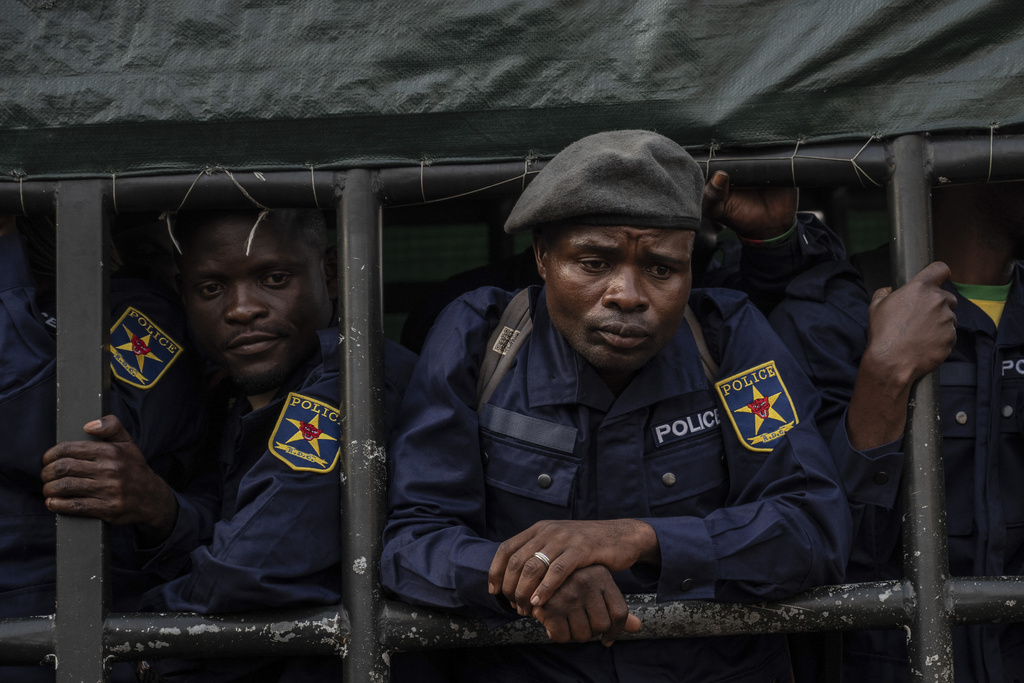Speaking to the United Nations Security Council in February, the Democratic Republic of the Congo’s Minister for Foreign Affairs, Thérèse Kaykwamba Wagner, said more than 4,000 people were killed in 48 hours when Rwanda-backed M23 rebels overran the city of Goma.
“Goma has been taken hostage by the war,” she said, noting that Rwanda’s presence in her country is no longer up for debate. Independent U.N. experts have documented that between 3,000 and 4,000 Rwandan troops are in eastern DRC to support the M23.
Wagner characterized the latest violent conflict in eastern DRC as a “political project spearheaded by Rwanda” using M23 as a proxy to topple the government in Kinshasa.
“Ours is a people marked by war,” she said.
Eastern DRC has been home to armed conflicts and mass displacement for decades, as the recent onslaught by M23 has forced hundreds of thousands of people from their homes.
The M23, or March 23 Movement, takes its name from a peace accord signed on that date in 2009, which ended a previous Tutsi-led rebellion in eastern DRC. The current offensive stems from the group’s resurgence in 2022 after 10 years of lying dormant.
M23 has accused the DRC’s government of not living up to the peace deal or integrating Tutsis into the army and regional government offices. Congolese President Felix Tshisekedi calls the M23 a terrorist group and has sought international support for sanctions against Rwanda.
“M23 believes that the government is not adequately securing the Rwandaphone communities in eastern DRC, including protecting them from hate and armed groups,” independent research institute the International Peace Information Service wrote in a February analysis. “Competition over access to land, and the role that local authorities play in land management, have fed tensions that pitted communities against each other.
“What is new, however, is that M23’s demands have increasingly taken on a national political dimension, going beyond the protection of Rwandaphone communities in the Kivu provinces. The movement is now also turning directly against the regime in Kinshasa.”
For years, M23 and Rwanda have aimed to flush out and bring to justice the ethnic Hutu militia called the Democratic Forces for the Liberation of Rwanda, whose ranks fled Rwanda after participating in the genocide that killed nearly 1 million Tutsis and moderate Hutus.
For more than a year M23 also has controlled coltan mining around Rubaya in North Kivu province that generates about $800,000 a month through taxes, according to the U.N. experts.
Some experts say that the mineral-rich eastern lands are a significant factor in the conflict. Eastern DRC is rich in cobalt, diamonds, gold and other coveted minerals. The fact that rebel groups can finance their activities from the sale of minerals only perpetuates the violence.
Ugandan researcher Ponsiano Bimeny, however, asserts that despite thriving mining and smuggling operations, natural resources are not the primary cause for M23’s renaissance.
“The international community’s understanding of the crisis has focused on the nexus of natural mineral exploitation and conflict, accusing Uganda and Rwanda of manipulating the conflict to plunder DRC’s mineral resources.
“Even if these claims were accurate, this is a simplistic representation of Congo’s problems with the resource curse — just one of an interconnected yet confusing array of causes and drivers,” he wrote in a March 12 blog for the London School of Economics and Political Science.
Running parallel with the seemingly never-ending conflicts in eastern DRC are peace efforts, most of which have failed to even bring the parties together for dialogue.
Kristof Titeca, a political scientist at the University of Antwerp, compared past violence in eastern DRC with the current fighting, citing the Congolese government’s weak state capacity and its hostile relations with Rwanda as key underlying factors.
Indeed, little has changed since M23’s first uprising in 2012, which traces back to the formal end of the Second Congo War in 2003.
“If you look at why that conflict happened, how that conflict happened and what the prospects are, it is still the very same factors that are key,” Titeca told World Politics Review.

